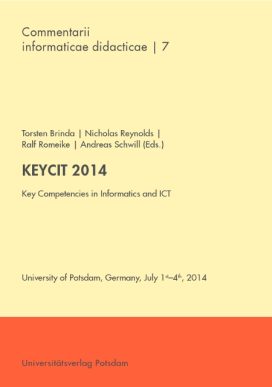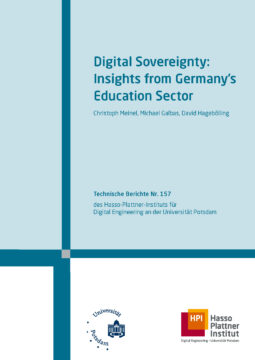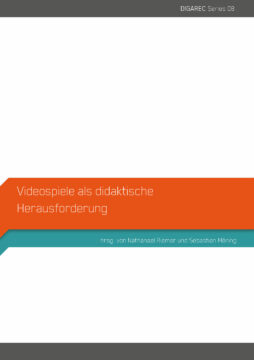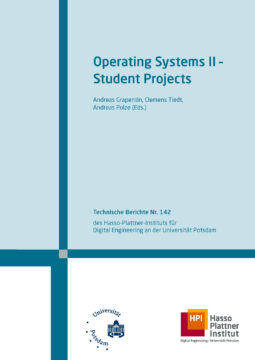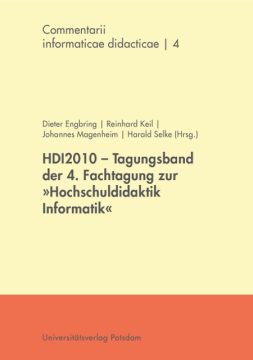In our rapidly changing world it is increasingly important not only to be an expert in a chosen field of study but also to be able to respond to developments, master new approaches to solving problems, and fulfil changing requirements in the modern world and in the job market. In response to these needs key competencies in understanding, developing and using new digital technologies are being brought into focus in school and university programmes. The IFIP TC3 conference „“KEYCIT – Key Competences in Informatics and ICT (KEYCIT 2014)““ was held at the University of Potsdam in Germany from July 1st to 4th, 2014 and addressed the combination of key competencies, Informatics and ICT in detail. The conference was organized into strands focusing on secondary education, university education and teacher education (organized by IFIP WGs 3.1 and 3.3) and provided a forum to present and to discuss research, case studies, positions, and national perspectives in this field.
Torsten Brinda , Nicholas Reynolds, Ralf Romeike , Andreas Schwill
Torsten Brinda; Nicholas Reynolds; Ralf Romeike; Andreas Schwill (Hrsg.)
key competencies in informatics and ICT
ISBN: 978-3-86956-292-6
438 Seiten
Erscheinungsjahr 2015
Reihe: Commentarii informaticae didacticae (CID) , 7
19,50 €
Nicht steuerbarer Umsatz entsprechend § 1 (1) UStG in Verbindung mit § 2 (3) UStG a.F. Die Universität Potsdam bildet im Rahmen dieser Leistungserbringung keinen Betrieb gewerblicher Art entsprechend § 1 (1) Nr. 6 bzw. § 4 KStG. Im Fall der nachträglichen Einstufung als Betrieb gewerblicher Art behalten wir uns das Recht vor, die Umsatzsteuer ergänzend in Rechnung zu stellen. zzgl. Versandkosten
In our rapidly changing world it is increasingly important not only to be an expert in a chosen field of study but also to be able to respond to developments, master new approaches to solving problems, and fulfil changing requirements in the modern world and in the job market. In response to these needs key competencies in understanding, developing and using new digital technologies are being brought into focus in school and university programmes. The IFIP TC3 conference „“KEYCIT – Key Competences in Informatics and ICT (KEYCIT 2014)““ was held at the University of Potsdam in Germany from July 1st to 4th, 2014 and addressed the combination of key competencies, Informatics and ICT in detail. The conference was organized into strands focusing on secondary education, university education and teacher education (organized by IFIP WGs 3.1 and 3.3) and provided a forum to present and to discuss research, case studies, positions, and national perspectives in this field.
Das könnte Sie auch interessieren
-
 2023
2023Christoph Meinel, Michael Galbas, David Hagebölling
Digital sovereignty
0,00 €Nicht steuerbarer Umsatz entsprechend § 1 (1) UStG in Verbindung mit § 2 (3) UStG a.F. Die Universität Potsdam bildet im Rahmen dieser Leistungserbringung keinen Betrieb gewerblicher Art entsprechend § 1 (1) Nr. 6 bzw. § 4 KStG. Im Fall der nachträglichen Einstufung als Betrieb gewerblicher Art behalten wir uns das Recht vor, die Umsatzsteuer ergänzend in Rechnung zu stellen.
In den Warenkorb -
 2020
2020Heiko Christians, Nathanael Riemer, Jan Distelmeyer, Sebastian Möring, Manuela Pohl, Sebastian Ernst, Heiko Brendel, Martin Thiele-Schwez, André Czauderna, Stephan Günzel
Videospiele als didaktische Herausforderung
22,50 €Nicht steuerbarer Umsatz entsprechend § 1 (1) UStG in Verbindung mit § 2 (3) UStG a.F. Die Universität Potsdam bildet im Rahmen dieser Leistungserbringung keinen Betrieb gewerblicher Art entsprechend § 1 (1) Nr. 6 bzw. § 4 KStG. Im Fall der nachträglichen Einstufung als Betrieb gewerblicher Art behalten wir uns das Recht vor, die Umsatzsteuer ergänzend in Rechnung zu stellen.
zzgl. Versandkosten
In den Warenkorb -
 2023
2023Grapentin, Andreas; Polze, Andreas; Tiedt, Clemens (Hrsg.)
Operating Systems II – Student Projects
0,00 €Nicht steuerbarer Umsatz entsprechend § 1 (1) UStG in Verbindung mit § 2 (3) UStG a.F. Die Universität Potsdam bildet im Rahmen dieser Leistungserbringung keinen Betrieb gewerblicher Art entsprechend § 1 (1) Nr. 6 bzw. § 4 KStG. Im Fall der nachträglichen Einstufung als Betrieb gewerblicher Art behalten wir uns das Recht vor, die Umsatzsteuer ergänzend in Rechnung zu stellen.
In den Warenkorb -
 2011
2011Reinhard Keil, Johannes Magenheim, Harald Selke, Dieter Engbring
HDI2010 – Tagungsband der 4. Fachtagung zur „Hochschuldidaktik Informatik“
10,00 €Nicht steuerbarer Umsatz entsprechend § 1 (1) UStG in Verbindung mit § 2 (3) UStG a.F. Die Universität Potsdam bildet im Rahmen dieser Leistungserbringung keinen Betrieb gewerblicher Art entsprechend § 1 (1) Nr. 6 bzw. § 4 KStG. Im Fall der nachträglichen Einstufung als Betrieb gewerblicher Art behalten wir uns das Recht vor, die Umsatzsteuer ergänzend in Rechnung zu stellen.
zzgl. Versandkosten
In den Warenkorb
Verlag kompakt
Kontakt
Universitätsbibliothek Potsdam
Universitätsverlag
Am Neuen Palais 10
14476 Potsdam
verlag@uni-potsdam.de
0331 977-2094
0331 977-2292

